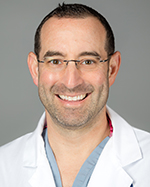Improving Standard of Care for Ocular Melanoma Patients with Liver Metastasis
Ocular melanoma, the most common intraocular malignancy, is extremely rare. It affects roughly five out of every million people. Unfortunately, the cancer frequently spreads to the liver for this group of patients, and there is no established standard of care.

Dr. Jonathan Zager, Surgical Oncology, Cutaneous Oncology Program
Moffitt Cancer Center is hoping to change that. Dr. Jonathan Zager, a surgical oncologist in the Cutaneous Oncology Program, is the lead international principal investigator of a multicenter clinical trial evaluating a new type of therapy for hepatic-dominant ocular melanoma patients. It’s called percutaneous hepatic perfusion, or PHP. Zager is comparing this to chemoembolization, pembrolizumab, ipilimumab or dacarbazine.
Unlike traditional chemotherapy that circulates throughout the entire body, PHP uses a series of catheters and balloons to isolate the liver from the body’s circulatory system allowing for high dose chemotherapy to be delivered directly to that organ. The blood is collected as it exits the liver and filtered outside the body via bypass to remove any remaining chemo. Patients receive PHP six times, six to eight weeks apart.
Moffitt treated the first PHP patient on the phase 3 trial, and earlier this month completed treatment on the last PHP patient in the study. Zager presented preliminary results from the trial at this year’s American Society of Clinical Oncology annual meeting. He says the results are promising.
“The objective response rate, meaning evidence tumors are responding to therapy, for PHP patients are almost triple compared to the best alternative care options. And just over 7% of the patients in the PHP arm of the trial had a complete response to therapy versus none in the best alternative care group,” said Zager.
He also noted progression free survival for PHP patients was triple compared to the best alternative care group.
“We’re very excited about these results and hopefully can bring this treatment to more patients and help them with their hepatic-dominant ocular melanoma,” he said.



